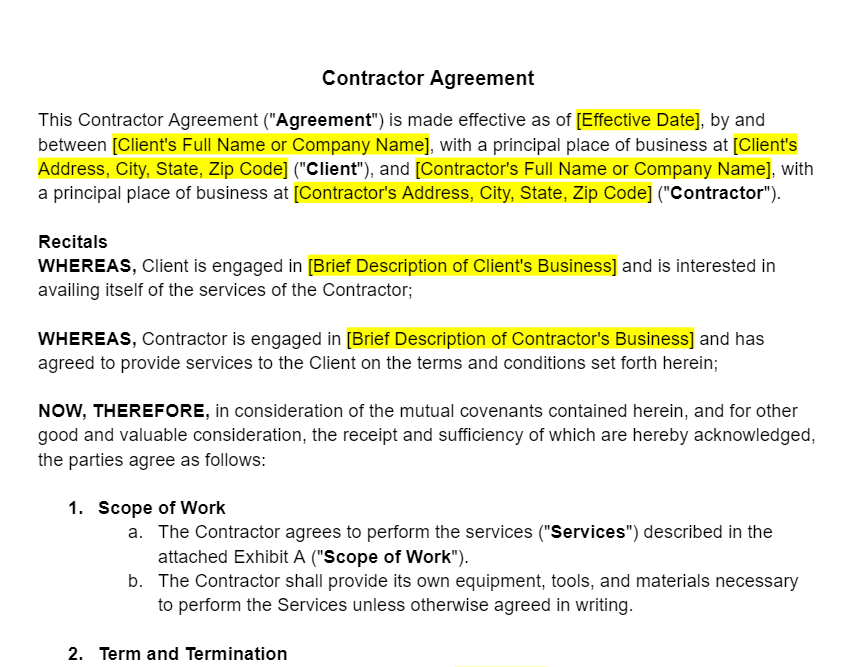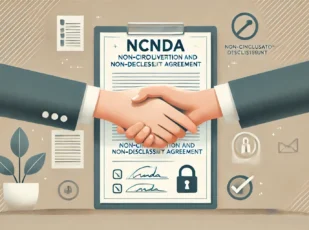
Contractor’s Agreement Template
8 Downloads
Commercial
January 7, 2025
Sayantani Dutta
The world has been very fast to transition to a gig economy marketplace. Freelance work and contractual jobs have become increasingly prevalent. All of this work being contracted and produced—surely, it needs some legal protections for the benefit of both parties involved in such a transaction. Enter the Contractor’s Agreement!
This agreement is a legal document that defines the terms of engagement between a contractor and their client. So, if an LED lights manufacturer wishes to hire a freelance 3D artist to do some animated mockups, they need to be able to tell them the terms of this engagement—like not to share trade secrets or the provisions for revisions if the board does not like the output. This document is instrumental in clarifying stuff like that.
More specifically, the Contractor’s Agreement clarifies the scope of work, payment arrangements, deadlines, and any other key aspects of the contractual relationship.
In this article, we are going to unpack all about this agreement—from telling you what it is and why it is important to list the key components of such an agreement and the risks associated with not having an adequate one for your business. So, let’s get right into it!
What is a Contractor’s Agreement?
A Contractor’s Agreement (also called an independent contractor agreement) is the groundwork on which a working relationship between a contractor and their client is built. The entire agreement covers a lot of bases. For example, on one hand, the confidential information provision of this agreement protects your intellectual property rights and on the other hand, the severability clauses offer the much-needed indemnification to protect you from legal action under the governing law.
Mainly, the Contractor’s Agreement outlines the entire scope of the project, compensation/reimbursement, timeline, and all specific requirements and expectations unique to the service being contracted by the client. The terms of this agreement are the starting point to begin a proper working relationship between the client and contractor, and as such, the Contractor’s Agreement is utilized across various industries and professions—ranging from construction and consulting to freelance writing and design.
Without this agreement in place, there is hardly any substantial way to ensure that both the contractor and the client have a clear understanding of their mutual obligations.
The Importance of a Contractor’s Agreement
There are four key reasons why anyone should have a solid Contractor’s Agreement to begin work.
First of all, the agreement offers ample clarity and protection for both parties. The clauses and terms of this agreement clearly set down the expectations and responsibilities of both parties. This, in turn, significantly reduces the potential for misunderstandings, ambiguities, and most importantly, disputes. If subcontractors are to be used, then the terms will also apply to all of them.
Second, a robust Contractor’s Agreement also offers legal security. This legal protection (again, for both parties) makes sure that there are remedies and consequences in the event of non-compliance or breach of agreement. Also, the agreement’s payment terms can be used for income tax purposes when you are filing with the Internal Revenue Service (IRS).
Next, there are also benefits in the context of project management and the scope of work. The agreement can help manage the project more efficiently by setting up clear deadlines, deliverables, and payment terms. This is particularly important for hiring freelancers for any kind of creative work, where measuring the output can be a little difficult. So, you tell the contractor that you are supposed to provide the following services up to this particular standard and receive this lump sum amount for such services, for example. On the other hand, the freelancer or contractor can specify the extent to which they are willing to improve, revise, or work on feedback. This prior written consent is legally binding and anything beyond the warranties discussed in the terms of the Contractor’s Agreement can be sufficient cause for the termination of this agreement—saving either party from further hassle.
Lastly, we would be remiss to ignore the professionalism that you get with a proper, unique Contractor’s Agreement in place. Such an agreement makes everything more professional and ensures that the contractual agreement is carried out in good faith. This further improves trust and confidence between the contractor and the client, which can come in handy if you ever need to repeat the services or if you just want to set an example of professionalism for when you work with others in the future. This professionalism is a solid legal basis to avoid the attorney’s fees you will be looking at in the case of legal dispute just because there was no disclaimer on how the completion of the services is to be measured or approved, for example.
What if You Don’t Have a Good Contractor’s Agreement
The independent contractor agreement template a lot of businesses are going to rely on is going to be a free one. These are often inadequate—only customizable to a limited extent, unable to cover all applicable laws in your state, or simply lacking in sections or enforceability. In other words, a free independent contractor agreement is highly likely to skip some key details, which will make legal disputes and the engagement of a law firm inevitable down the line if expectations are not met.
Proceeding without a comprehensive Contractor’s Agreement or relying on such a generic and poorly drafted template leads to several issues:
- Misunderstandings and Disputes: Most importantly, you are looking at a higher risk of misunderstandings, confusion, ambiguities, or unclear expectations/responsibilities without a clear agreement. There could be misunderstandings about the exact deliverables, the scope of work, deadlines, or the payment terms, for example. This can quickly escalate to legal disputes under the laws of the state.
- Legal Vulnerabilities: Both parties are more vulnerable to legal complications and financial losses if the agreement does not adequately protect their interests or if the terms are not clearly defined. With an inadequate agreement, you are opening yourself up to problems in liability insurance, employee benefits, workers’ compensation, or other types of financial risk that might emanate from the service provider.
- Project Delays: If a timeline is not enforced correctly, the project will most likely be delayed. That is why a Contractor’s Agreement should have ample clarity on project milestones and deadlines. It is also recommended that for timely project completion and better satisfaction overall, you break down your deliverables and scope of work into smaller components, all with their own tentative timelines or strict deadlines.
- Threat to IP: The Contractor’s Agreement includes clauses on IP rights and terms on how to correctly use copyrights, logos, and trademarks during the project’s duration. These terms need to be comprehensive and detailed. Even a single chink in the armor can make a business vulnerable to damage in terms of brand reputation. For example, a contractor might advertise your logo as a client and in doing so, might club you with other unsavory brands. As there is no condition forbidding them to do so, you have no recourse here. And it will already be too late to consider the modification of this agreement once signed. For a complete, full force agreement, consider adding a non-disclosure agreement to the mix with the contractor name and the terms about the protection of such information such as trade secrets or internal documentation that will be received and used by the contractor during the project.
Apart from all these risks and threats, there is also the damage to professional reputation that we need to talk about. Basically, any conflicts arising from misunderstandings, unmet expectations, or simply the lack of complete understanding damage the professional relationship between the contractor and the client. This potentially impacts future collaborations with the same parties or others.
Of course, we do not want any of that. So, what should a Contractor’s Agreement ideally include to cover all bases and be as comprehensive as possible?
Contractor’s Agreement—Key Elements
Alright, now that you understand the importance and benefits of a robust Contractor’s Agreement, it is time we take a closer look at the key components that make up this agreement. Please keep in mind that the exact details under each section will differ from project to project, even among the same two parties (like if you re-contract the same service provider for another project). Also, additions or removals might be in order depending on the nature of the work.
Nevertheless, generally speaking, here are some key elements that a good Contractor’s Agreement is likely to have:
- Scope of Work: The agreement thoroughly outlines the entire scope of work. It covers the services to be provided, their specific details, and broken down expectations or standards so that there is sufficient clarity for both parties about the extent of the project. All this will be agreed upon before the agreement is drafted and signed, preferably.
- Compensation and Payment Terms: The agreement then details the payment arrangements, including the rates, schedules, and methods, to prevent financial disputes. If necessary, break down the payments for chunks of work, with the clauses that these services are to be performed in this manner, and payments will be made incrementally based on the completion of the milestones set down in the agreement.
- Timeline and Deadlines: You also need to outline the project timeline, including the start and end dates, along with specific milestones and deadlines. This is often done after the scope of work has been broken down into chunks. You refer to those chunks or points here and specify the timelines by which they need to be finished or delivered.
- Quality and Standards: Expand upon the basic teaser you put in the Scope of Work here. These clauses specify the expected quality and standards for the work to be delivered. To make sure that your requirements are met, you will often need to do some due diligence and offer guidance, detailed instructions, references, older samples, and so on. Make sure that the contractor understands your quality expectations before signing the agreement.
- Confidentiality and Intellectual Property: Next up, the agreement will address confidentiality concerns and intellectual property rights. This protects both parties’ rights. The most straightforward clause here is that all output generated or creative work done under this agreement is to be the sole property of the client. In some cases, it is made possible for the contractor to display such output as part of their body of work (in their portfolio or showreel, for example). If that is the case, then you might want to limit just how much it can be used. Apart from that, also make sure that the agreement has clauses protecting your IPs (copyright, branding, trademarks, trade names, etc.) and trade secrets (such as internal documents about market research or product development briefs). In most cases, it is sufficient to mention that all IPs, trade secrets, and confidential information is protected and can only be used as necessary for the completion of the project, and for no other purpose.
- Termination Conditions: This section will describe the conditions under which the agreement can be terminated for a clear exit strategy for both parties if the arrangement or work becomes infeasible. For example, if the quality standards are not met or if there are too many protracted delays, this can void the agreement. Whether it is the client providing feedback on the work in a timely manner or the contractor ensuring they do their due diligence in meeting expectations—these clauses need to be comprehensive so there is a clear way out and no more time or effort is wasted.
- Dispute Resolution: Lastly, before the signatures, you will include the dispute resolution section. This section provides a mechanism for resolving any disagreements, disputes, or conflicts that may arise during the course of the project. Typically, this will include the jurisdiction in which any legal action can be taken.
The idea is to make your Contractor’s Agreement clear, orderly, and equitable. The process of creating the agreement needs to be as thorough as you want the terms to be comprehensive. A good Contractor’s Agreement including all these key elements will not only help you manage your contractual engagements better, but will also protect the interests and rights of both parties.
Say Yes to Effective Contractual Relationships with FreshDox.com!
The Contractor’s Agreement plays an indispensable role in the modern age. Today’s business environment is run on collaborations between specialists. For an organization with a one-time need such as a product launch campaign, it makes much more sense to hire a digital marketing agency for a period of time rather than hiring personnel, for example. This happens all across the world, across all domains and industries. That is what makes having a robust, comprehensive, and legally sound Contractor’s Agreement so important.
Here at FreshDox.com, we have just the right solution for you—a professionally designed template that surpasses the generic versions you will find online. Crafted by legal professionals, our Contractor’s Agreement Template is all about ensuring clarity, comprehensiveness, and enforceability. What’s more, it is fully customizable, can adhere to specific state laws as needed, and have its sections added/removed/edited as per your unique needs!
Subscribe to FreshDox.com today and gain access to a vital resource for drafting your Contractor’s Agreement, backed by a wide array of other legal and business-related document templates available in PDF and Word format. We also offer a 14-day trial period for new users—using which you can test our Basic (up to 3 downloads per month) and Premium (unlimited downloads) Membership tiers.
Whether you are a freelancer, a contractor, or a business engaging contractual services, FreshDox.com has you covered. We will make sure that your Contractor’s Agreement meets the highest standards of clarity and legal soundness. So, what are you waiting for?! Opt for FreshDox.com’s Contractor’s Agreement Template and safeguard your projects, minimize potential disputes, and succeed in your contractual relationships today—all backed by the expertise and reliability of legal experts!
Related Templates
Discover more templates that align with your needs and preferences.

Ready to Sign Up?
Sign up for FreshDox.com’s 7-day trial and discover why so many individuals and businesses trust us for their legal document template needs.
- Cancel any time
- 7-day free trial
- From 300+ Customer Reviews
















